

President Trump’s pledge to “make America wealthy again” may feel rather ambitious for S&P 500 companies who were ‘liberated’ of $2.5 trillion dollars in yesterday’s session as the markets digested the impact of tariffs.
The index’s worst day since 2020 saw a drop of near 5% while the Nasdaq lost almost 6%, and the Dow Jones tumbled more than 1600 points (4%). Futures are also headed lower Friday with Dow and S&P 500 expected to open around 1% lower and the Nasdaq down around 0.6%.
Interactive Brokers chief strategist, Steve Sosnick, pointed out that there is another potential market mover for the last session of the week – the March employment report.
“Consensus expectations – remember them? – are for an increase of 140,000 Nonfarm Payrolls, down from 151k in February, and an Unemployment Rate that will remain at 4.1%,” he said. “The IBKR Probability Lab once again shows a slight bias toward a bounce, though far less pronounced than yesterday – and at far lower levels.”
The greenback also lost value Thursday, down around 1.5% yesterday, and benchmark Treasuries slipped briefly below the 4% threshold.
But the president has said that the wide-reaching tariffs is about long-term prosperity and not how the markets react, although his tolerance for economic pain is likely to be tested according to many economists.
JPMorgan’s chief economist Bruce Kasman wrote in a client note he titled ‘There Will Be Blood’ that the tariffs are the largest tax hike that US households and businesses have faced in 57 years.
“The effect of this tax hike is likely to be magnified — through retaliation, a slide in US business sentiment, and supply chain disruptions,” he warned, adding that his firm now sees the risk of a US recession at 60%, up from its previous 40%, if the tariffs remain.
He is not alone; a survey of economists by Bloomberg following the tariff announcement reveals that more than nine in ten of the 54 respondents believe that a US economic downturn in the next 12 months is now a greater possibility. A similar share expects inflation to increase, and 93% think GDP will be lower.
Six in ten economists who took part think that the tariffs will increase the efforts of trading partners to ink new trade agreements with the US.
But while any potential deals are being worked out, uncertainty remains, and Michael Arone, chief investment strategist, US SPDR Business, State Street Global Advisors, told InvestmentNews that, in the meantime, market participants are not willing to wait and see.
“Instead, investors are selling first and asking questions later,” he said. “If, and it’s a big if, Trump’s reciprocal tariffs result in lower overall global trade barriers, risk assets will rebound swiftly. But if our trading partners retaliate and pursue countermeasures, economic growth will plunge and markets likely will too.”
Arone says investors should consider all the options.
“It’s especially important in these times for investors to keep in mind that things are never as good or as bad as they seem in the capital markets,” he said. “For investors looking for a place to ride out the storm, safe havens, defensive sectors, services, and dividend growers should provide much needed resilience for portfolios."

A Texas-based bank selects Raymond James for a $605 million program, while an OSJ with Osaic lures a storied institution in Ohio from LPL.

The Treasury Secretary's suggestion that Trump Savings Accounts could be used as a "backdoor" drew sharp criticisms from AARP and Democratic lawmakers.

Changes in legislation or additional laws historically have created opportunities for the alternative investment marketplace to expand.

Wealth managers highlight strategies for clients trying to retire before 65 without running out of money.

Shares of the online brokerage jumped as it reported a surge in trading, counting crypto transactions, though analysts remained largely unmoved.
Orion's Tom Wilson on delivering coordinated, high-touch service in a world where returns alone no longer set you apart.
Barely a decade old, registered index-linked annuities have quickly surged in popularity, thanks to their unique blend of protection and growth potential—an appealing option for investors looking to chart a steadier course through today's choppy market waters, says Myles Lambert, Brighthouse Financial.
